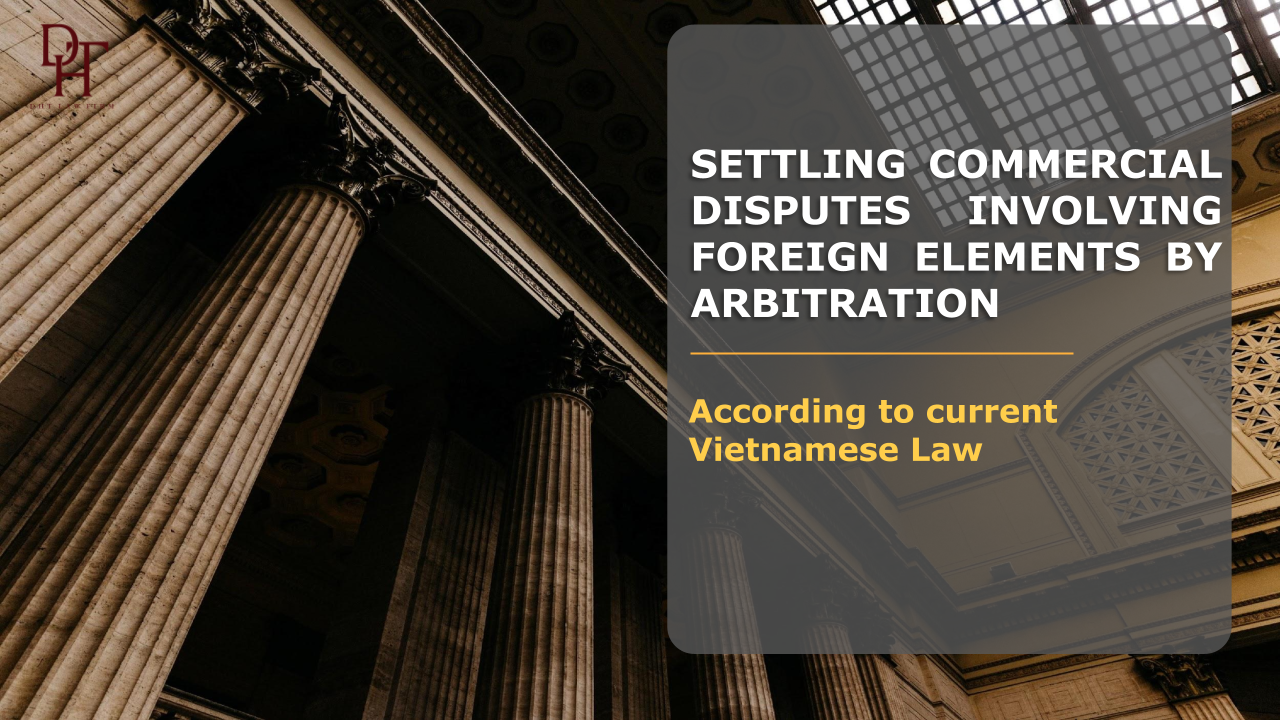
SETTLING COMMERCIAL DISPUTES INVOLVING FOREIGN ELEMENTS BY ARBITRATION ACCORDING TO CURRENT VIETNAMESE LAW
Arbitration, and typically commercial arbitration, is an Alternative Dispute Resolution (ADR) which is agreed by parties of the dispute. Arbitration can be used to replace the traditional way of litigation in court.
With such pros like simple procedure and flexibility as agreed by parties help parties to settle their dispute faster. Moreover, all stages of arbitration are confidential; hence, by using arbitration, entrepreneurs’ reputations are remained to save.
The following article will help you to understand more about settling commercial disputes involving foreign elements by arbitration according to current Vietnamese Law.
I. Definition
Commercial disputes involving foreign elements are disputes that extend beyond the territorial border of a country and have typical signs and legal features compared to commercial disputes in the country. Specifically:
- One or more parties (including organizations and individuals) have foreign nationalities;
- Bases that arise, change or terminate the dispute are in a foreign country;
- Properties disputed are in a foreign country;
- Applicable laws include: international conventions, national laws, cases, incoterms, …
II. Legal issues related to arbitral proceedings
1. Arbitration's jurisdiction to settle disputes
According to Article 2, Law on Commercial Arbitration 2010, Arbitration settles the following disputes:
- Disputes among parties which arise from commercial activities.
- Disputes among parties at least one of whom conducts commercial activities.
- Other disputes among parties which are stipulated by law to be settled by arbitration.
2. Arbitration agreement
The arbitration agreement is used to determine the method of settling disputes by arbitration. The arbitration agreement is independent of other terms of contracts; invalid contracts or unenforceable contracts shall not invalidate the arbitration agreement.
The arbitration agreement is established in writing before or after disputes arise:
- Before disputes arise: may be made in the form of an arbitral clause in a contract, a contract appendix or in the form of a separate agreement.
- After disputes arise: Arbitration agreement in writing.
The following forms of agreement may also be regarded as written form:
- Agreement made through communication between the parties by telegram, fax, telex, email or other forms provided for by law;
- Agreement made through exchange of written information between the parties;
- Agreement recorded in writing by a lawyer, notary public or competent institution at the request of the parties:
- In their transactions, the parties make reference to a document such as a contract, document, company charter or other similar documents which contains an arbitration agreement;
- Agreement made through exchange of petitions and self-defense statements which reflect the existence of an agreement proposed by a party and not denied by the other party.
3. Rules of proceedings
Rules of proceedings (arbitral proceedings) comply with selected Rules of Proceedings of Arbitration Center or parties’ agreement.
4. Languages
For disputes involving foreign elements the parties shall reach agreement on the language to be used in arbitral proceedings. If they have no such agreement, the arbitration council shall decide on the language to be used in arbitral proceedings.
5. Applicable laws for dispute settlement
For a dispute involving foreign elements, the Arbitration Council shall apply the law selected by the parties. If the parties have no agreement on the applicable law, the arbitration council shall decide to apply a law it sees the most appropriate.
When the Vietnamese law or law selected by the parties contains no specific provisions concerning the dispute, the arbitration council may apply international practices for settling the dispute, provided such application or consequence of such application does not contravene the fundamental principles of Vietnamese law.
III. Arbitral proceedings
1. Initiation of lawsuits (Arbitration request)
2. Formation of an arbitration council
3. Preparation for judgment
4. Mediation
5. Disputes settlement meeting
6. Issuing an arbitral award
IV. Enforcement of arbitral awards
1. Voluntary compliance with arbitral awards
The State encourages the parties to voluntarily comply with arbitral awards. Arbitral awards shall be enforced under the law on the enforcement of civil judgments.
2. Right to request compliance with arbitral awards
Past the time limit for complying with an arbitral award, if the party to comply with the award fails to voluntarily comply with it and does not request cancellation of the award under Article 69 of this Law. the party in favor of whom/which the arbitral award is issued may request in writing the competent civil judgment enforcement agency to enforce the award.
For ad hoc arbitration awards, the creditor may request in writing the competent civil judgment enforcement agency to enforce the award after it is registered under laws.
In addition, Vietnamese arbitral awards are also accepted and complied with countries that are members of the New York Convention 1958.
V. Cancellation of arbitral awards
1. Grounds for cancellation of arbitral awards
- There is no arbitration agreement or the arbitration agreement is invalid;
- The arbitration council's composition or procedures of arbitral proceedings is/arc incompliant with the parties' agreement or this Law:
- The dispute falls beyond the arbitration council's jurisdiction: when an arbitral award contains the details falling beyond the arbitration council's jurisdiction, such details shall be canceled:
- The evidence provided by the parties on which the arbitration council bases to issue the award is counterfeit: an arbitrator receives money, assets or other material benefits from one disputing party, thus affecting the objectivity and impartiality of the award;
- The award contravenes the fundamental principles of Vietnamese law.
2. Right to request cancellation of arbitral awards
Within 30 days after receiving an arbitral award, if a party has sufficient grounds for evidencing that the arbitration council has issued the award falling into any of the cases specified in Clause 2, Article 68 of this Law, it may file a request with the competent court for cancellation of such award. Such requests must be enclosed with documents and evidence proving that such request is grounded and lawful.
